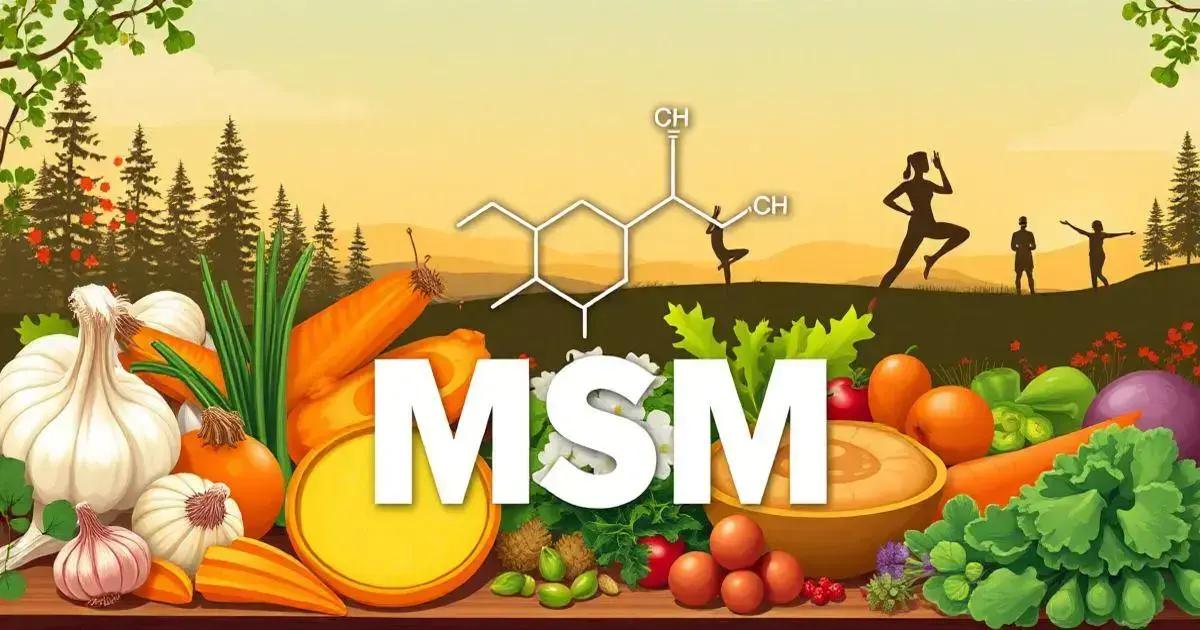MSM (methylsulfonylmethane) is a natural sulfur compound that offers health benefits such as reducing inflammation and supporting joint health. It works by inhibiting inflammation, enhancing collagen production, and providing antioxidant effects. Commonly used for joint pain relief and exercise recovery, MSM is typically taken in doses of 1,500 mg to 6,000 mg daily. While generally safe, it may cause gastrointestinal discomfort or allergic reactions, so consulting a healthcare professional before use is recommended.
MSM, or methylsulfonylmethane, is a naturally occurring compound found in various foods and plants. Known for its anti-inflammatory properties, MSM has gained popularity as a dietary supplement for promoting joint health and overall well-being. In this article, we will explore the numerous benefits of MSM and how it can enhance your health.
What is MSM (Methylsulfonylmethane)?
What is MSM (Methylsulfonylmethane)?
MSM, or methylsulfonylmethane, is a naturally occurring sulfur compound found in various foods, plants, and even in the human body. It is an organosulfur compound that plays a crucial role in the body’s biochemical processes. MSM is primarily known for its anti-inflammatory and antioxidant properties, making it a popular dietary supplement for those seeking to improve joint health and reduce pain.
This compound is derived from dimethyl sulfoxide (DMSO) and is often extracted from natural sources like plants, fruits, and vegetables. MSM is most commonly found in foods such as garlic, onions, cruciferous vegetables (like broccoli and Brussels sprouts), and certain grains. However, the amount of MSM present in these foods is relatively low, which is why many individuals choose to supplement with MSM for enhanced benefits.
In addition to its use in joint health, MSM has been studied for its potential benefits in skin health, exercise recovery, and overall inflammation reduction. Its natural origins and safety profile make it an appealing choice for those looking to support their health through dietary supplements.

Health Benefits of MSM
Health Benefits of MSM
MSM (methylsulfonylmethane) is associated with a variety of health benefits, primarily due to its anti-inflammatory and antioxidant properties. Here are some of the key health benefits of MSM:
- Reduces Joint Pain and Inflammation: One of the most well-known benefits of MSM is its ability to alleviate joint pain and reduce inflammation. Studies have shown that MSM can be effective in managing pain associated with osteoarthritis and other joint conditions.
- Supports Healthy Connective Tissue: MSM contributes to the formation of collagen and other proteins that are essential for maintaining healthy connective tissues. This can help improve joint function and support overall joint health.
- Enhances Exercise Recovery: MSM may aid in reducing muscle soreness and improving recovery time after exercise. By reducing inflammation and oxidative stress, it can help athletes and active individuals recover more quickly from workouts.
- Improves Skin Health: Due to its anti-inflammatory properties, MSM can benefit skin health by reducing redness, irritation, and the appearance of wrinkles. It is often included in skincare products for its potential to promote a healthy complexion.
- Boosts Immune Function: MSM has been shown to enhance immune system function, potentially helping the body better respond to infections and illnesses. Its antioxidant properties may also help protect cells from damage.
Incorporating MSM into your health regimen can provide these benefits, making it a valuable supplement for those looking to improve joint health, enhance recovery, and support overall well-being.
How MSM Works in the Body
How MSM Works in the Body
MSM (methylsulfonylmethane) exerts its health benefits through various mechanisms in the body. Here’s how MSM works:
- Reduces Inflammation: MSM has potent anti-inflammatory properties that help inhibit the production of inflammatory cytokines and enzymes. By reducing inflammation, MSM can alleviate pain and swelling in joints and muscles.
- Supports Collagen Production: MSM is a source of sulfur, which is essential for the synthesis of collagen—a key protein that provides structure to skin, joints, and connective tissues. By promoting collagen production, MSM helps maintain healthy skin and joints.
- Enhances Antioxidant Defense: MSM possesses antioxidant properties that help neutralize free radicals in the body. By reducing oxidative stress, MSM can protect cells from damage and support overall cellular health.
- Improves Blood Circulation: MSM may enhance blood flow and circulation, which can facilitate the delivery of nutrients and oxygen to tissues. Improved circulation can aid in recovery and promote joint health.
- Supports Detoxification: MSM is thought to assist in the body’s natural detoxification processes by helping to remove toxins and waste products. This can contribute to improved overall health and well-being.
Through these mechanisms, MSM works synergistically in the body to support joint health, reduce inflammation, and promote recovery, making it a valuable addition to a health regimen.

Recommended Dosage and Usage
Recommended Dosage and Usage
When considering MSM (methylsulfonylmethane) as a dietary supplement, it’s important to follow appropriate dosage and usage guidelines to maximize its benefits while minimizing any potential side effects. Here are some recommendations:
- Typical Dosage: The common dosage range for MSM is between 1,500 mg to 6,000 mg per day, divided into two or three doses. Most studies suggest starting at a lower dose and gradually increasing it based on individual tolerance and health goals.
- Forms of MSM: MSM is available in various forms, including capsules, tablets, powders, and topical creams. The powdered form is particularly popular as it can be easily mixed into beverages or smoothies.
- Timing of Doses: For best results, MSM can be taken with meals to enhance absorption and reduce the likelihood of gastrointestinal discomfort. Dividing the total daily dosage into multiple doses throughout the day is also recommended for better efficacy.
- Duration of Use: MSM can be used for both short-term and long-term purposes. Many individuals may notice improvements in joint health and inflammation within a few weeks, but for chronic conditions, continuous use over several months may be necessary.
- Consult a Healthcare Professional: Before starting MSM, especially if you are pregnant, nursing, or have any underlying health conditions, consult with a healthcare provider. They can provide personalized recommendations and ensure MSM is appropriate for your specific health needs.
By adhering to these dosage and usage guidelines, you can effectively incorporate MSM into your health regimen and enjoy its numerous benefits safely.
Potential Side Effects
Potential Side Effects
While MSM (methylsulfonylmethane) is generally considered safe for most people and is well-tolerated, some individuals may experience side effects. Here are potential side effects to be aware of:
- Gastrointestinal Issues: Some users may experience digestive discomfort, including bloating, diarrhea, or nausea. Taking MSM with food can help minimize these effects.
- Allergic Reactions: Although rare, allergic reactions can occur, leading to symptoms such as skin rashes, itching, or difficulty breathing. If you notice any signs of an allergic reaction, discontinue use and seek medical attention immediately.
- Headaches: Some individuals may report experiencing headaches when taking MSM. If this side effect occurs, reducing the dosage or discontinuing use may be necessary.
- Fatigue: In some cases, users have reported feelings of fatigue or tiredness after taking MSM. If you experience this, consider adjusting your dosage or consulting a healthcare provider.
- Interactions with Medications: MSM may interact with certain medications, particularly blood thinners or anti-inflammatory drugs. It’s important to consult a healthcare professional before using MSM if you are taking other medications.
To minimize the risk of side effects, it is advisable to start with a lower dose and gradually increase it as needed. Always consult with a healthcare provider before adding any new supplement to your routine, especially if you have existing health conditions or are taking other medications.
Conclusion
MSM (methylsulfonylmethane) is a naturally occurring compound that offers a wide range of health benefits, particularly for joint health, inflammation reduction, and exercise recovery.
Its anti-inflammatory and antioxidant properties make it a valuable supplement for those seeking to improve their overall well-being.
Understanding how MSM works in the body, along with the appropriate dosages and potential side effects, is crucial for maximizing its benefits while ensuring safety.
By incorporating MSM into your health regimen, you can take proactive steps toward managing pain, supporting joint function, and enhancing recovery.
As with any supplement, it is essential to consult with a healthcare professional before starting MSM, especially if you have pre-existing health conditions or are taking other medications.
By doing so, you can safely enjoy the advantages of this remarkable compound and support your journey to better health.
FAQ – Frequently Asked Questions about MSM (Methylsulfonylmethane)
What is MSM and what are its benefits?
MSM, or methylsulfonylmethane, is a naturally occurring sulfur compound known for its anti-inflammatory properties, which can help reduce joint pain, support connective tissue health, and enhance exercise recovery.
How does MSM work in the body?
MSM works by reducing inflammation, supporting collagen production, enhancing antioxidant defenses, and improving blood circulation, which together contribute to its health benefits.
What is the recommended dosage for MSM?
The typical dosage for MSM ranges from 1,500 mg to 6,000 mg per day, divided into multiple doses. It’s advisable to start at a lower dose and adjust based on individual tolerance.
Are there any side effects associated with MSM?
Potential side effects of MSM include gastrointestinal issues, allergic reactions, headaches, and fatigue. Always consult a healthcare provider if you experience adverse effects.
Can I take MSM with other medications?
It’s important to consult a healthcare professional before using MSM if you are taking other medications, as it may interact with certain drugs, especially blood thinners.
Is MSM safe for everyone?
MSM is generally safe for most people, but individuals who are pregnant, nursing, or have specific health conditions should consult a healthcare provider before use.


